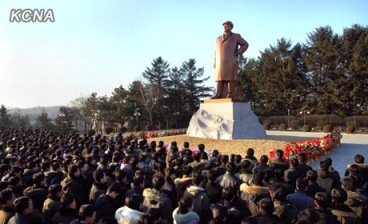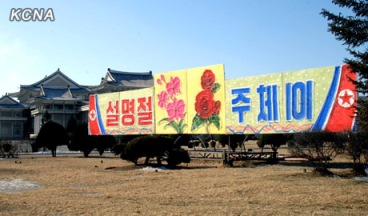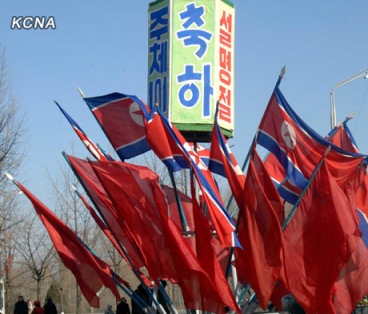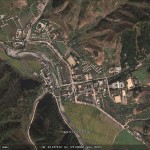UPDATE 5 (2012-1-17): The Associated Press is opening a Bureau in Pyongyang. Martyn Williams reports:
The Associated Press has opened a news bureau in Pyongyang making it the first western news agency to have a reporter and photographer based in the North Korean capital.
The bureau represents a coup for the AP over the competition, but its close cooperation with the state-run Korean Central News Agency, necessitated to realize the deal, brings with it questions over editorial independence.
AP President Tom Curley and KCNA President Kim Pyong Ho officially opened the bureau in Pyongyang on Monday. It came six months after the two met in New York and signed a basic agreement towards the office.
The bureau will be housed inside KCNA’s headquarters and will be permanently staffed by two North Koreans: reporter Pak Won Il and photographer Kim Kwang Hyon.
AP didn’t provide details of the background of the two and declined to say if they were on the payroll of AP or KCNA.
Regardless of their employment status, they were almost certainly trained in the North Korean media-slash-propaganda machine with books such as “The Great Teacher of Journalists” — a heavy tome filled with advice to journalists by Kim Jong Il. Their appointment would have been approved by North Korean authorities.
The two have already contributed to AP’s coverage over the last few weeks on the death of Kim Jong Il.
Pak was credited as providing details for several AP stories on the funeral, including “Thousands Gather In Snow To Mourn Kim Jong Il.” Kim Kwang Hyon is believed to be the photographer responsible for several unattributed photographs issued by AP of the funeral.
Video footage of the office released by KCNA shows pictures of Kim Il Sung and Kim Jong Il hanging on the wall above some desks. A TV hangs on the wall and there also appears to be a refrigerator and microwave oven.
It’s this closeness with KCNA that has AP walking a delicate editorial line.
AP is based on a traditional of independent reporting, and KCNA is anything but independent. Its Japan-based website describes the agency as speaking “for the Workers’ Party of Korea and the DPRK government,” and its daily output is heavy with glorification of its leader and threats against South Korea and the U.S.
But when it comes to North Korea, KCNA is the only game in town.
North Korea has remained one of the few places in the world that has remained almost totally impenetrable to foreign journalists. Visits are strictly supervised and controlled, and information flow in and out of the country is just a trickle. This was demonstrated vividly in December when governments and media organizations were apparently unaware that anything was amiss in the days before the death of Kim Jong Il was announced.
Getting coverage from Pyongyang, albeit with assistance from the government’s news agency, is probably better than nothing.
The real payoff will come in the regular reporting trips by AP staffers that form part of the deal. Korea Bureau Chief Jean Lee and Chief Asia Photographer David Guttenfelder will oversee the bureau and are likely to continue visiting the country.
It also gives AP a leg up on competitors such as Reuters and AFP when major news breaks in Pyongyang, such as the recent death of Kim Jong Il.
UPDATE 4 (2011-9-29): The Associated Press has signed a deal for HD video from the DPRK. According to themselves (notice it is a new story not a press release!):
Associated Press President and Chief Executive Tom Curley said Thursday the agency has signed an exclusive deal to provide high definition news video from North Korea to broadcasters worldwide.
In a speech in Tokyo, Curley unveiled the three-year agreement with North Korean state broadcaster KRT and the Ministry of Posts and Telecommunications.
“Today’s announcement means that AP will be the only news agency to transmit broadcast quality HD video of key events in North Korea,” he said at the Japan National Press Club.
Associated Press Television News will also have exclusive rights to deliver HD video feeds for individual broadcasters wishing to transmit their own reports from North Korea.
The infrastructure will be established ahead of 2012, when the so-called Hermit Kingdom celebrates the 100th anniversary of the birth of the late leader Kim Il Sung.
The deal extends AP’s recent push into North Korea to a level unmatched by any other Western news organization.
AP announced in June that it had also signed a series of agreements with the Korea Central News Agency, including one for the opening of a comprehensive news bureau in Pyongyang.
Expected to launch early next year, the office would be the first permanent text and photo bureau operated by a Western news organization in the North Korean capital. It would build upon the AP’s existing video news bureau, which opened in Pyongyang in 2006.
In addition, the agencies signed a contract designating the AP as the exclusive international distributor of contemporary and historical video from KCNA’s archive. The agencies also plan a joint photo exhibition in New York next year. They already had an agreement between them to distribute KCNA photo archives to the global market, signed earlier this year.
“This is a historic and watershed development,” Curley said. “For AP, it extends further and deeper our global reach and shows the trust that is at the core of AP reporting. For the world, it means opening the door to a better understanding between the DPRK and the rest of the world.”
The latest deal also highlights AP’s broader digital transformation efforts in a rapidly evolving media landscape.
AP, which sees video as a critical part of its future, is investing at least $30 million into its video business. Under an 18-month plan, the agency is upgrading all infrastructure to eventually provide HD video that “will fit easily into digital platforms of any media customer anywhere.”
Curley told the group of Japanese journalists that while the U.S. is “ground zero” for the digital media shift, “the movement of information consumption to online platforms and devices is here to stay, and it will inevitably upend traditional forms of media everywhere in the world.”
Founded in 1846, the AP maintains bureaus in some 100 countries around the world and is the oldest and largest of the world’s major news agencies.
UPDATE 3 (2011-7-12): Reuters is also establishing a presence in the DPRK.
UPDATE 2 (2011-7-1): The AP is opening a bureau in Pyongyang. According to Journalism.co.uk:
The Associated Press is to open a bureau in the North Korean capital Pyongyang, following an agreement with state news agency KCNA.
The new bureau will be the first permanent text and photo office operated by a Western news organisation in the North Korean capital. It follows the opening of an AP television office in the city five years ago.
Run by a notoriously secretive regime, North Korea also has a poor press freedom record. It is ranked 177 out of 178 countries on the Reporters Without Borders press freedom index.
Under the new agreement, AP will have exclusive global distribution of video content from the KCNA archive. The agreement has been negotiated over the past few months, with KCNA president Kim leading a delegation of executives to AP’s New York headquarters.
In March, chief executive Tom Curley and executive editor Kathleen Carroll were part of a delegation that traveled to Pyongyang.
Curley heralded the agreement as “historic and significant”.
“AP is once again being trusted to open a door to better understanding between a nation and the world. We are grateful for this opportunity and look forward to providing coverage for AP’s global audience in our usually reliable and insightful way.”
UPDATE 1 (2011-3-10): According to Yonhap, the AP is once again asking to open a bureau in Pyongyang:
Thee Associated Press (AP), one of the main news agencies in the U.S., has asked North Korean authorities to help it open a bureau in Pyongyang, a news report claimed Thursday.
Itar-Tass, a Russian news agency, reported from the North Korean capital that a delegation for AP, headed by its president and CEO Thomas Curley, made the request during its ongoing visit to Pyongyang.
Citing an informed Korean source, Itar-Tass reported that the AP delegation said opening a Pyongyang bureau “would make it possible to create in the United States an objective and truthful picture of events” taking place in the communist regime.
“However, there is no clarity so far on the issue of opening of the AP office,” the source was quoted as saying.
North Korea’s state media reported briefly on Tuesday of the arrival of the AP delegation, but didn’t elaborate on why AP was visiting and how long its delegation would stay.
A source in Seoul had earlier told Yonhap News Agency that Curley is scheduled to stay in Pyongyang until Friday and his visit may be aimed at trying to set up a news bureau in the reclusive state.
Among foreign news agencies, only Itar-Tass and China’s Xinhua have bureaus in Pyongyang, while a journalist from the People’s Daily newspaper of China is also based there.
Itar-Tass on Thursday said officials from Reuters, the London-based news agency, also visited Pyongyang earlier with a similar request.
AP Television News, the international video division of AP, opened a full-time office in Pyongyang in 2006, making it the first Western news organization to establish a permanent presence in North Korea. The Pyongyang office of APTN currently provides only video images.
Below is a report I posted in 2006 on the opening of the APTV office in Pyongyang.
ORIGINAL POST (2006-5-23): The Assoicated Press Television News is opening an office in Pyongyang. According to the Joong Ang Daily :
AP Television News, a British-based agency, opened a full-time office in North Korea yesterday, with three North Koreans to be on the permanent staff, said Toby Hartwell, marketing director of APTN in London.
With the bureau, the television service becomes the first Western news organization to provide regular coverage from the reclusive country.
The bureau’s staff will be recruited from the North’s state-run media. International staff from APTN will have frequent access to the country and work with them, Mr. Hartwell said.
Mr. Hartwell said APTN has been given access to the country, and he believes that will continue.
APTN is the international video division of the Associated Press. It delivers video content of breaking global news to broadcasters around the world.




